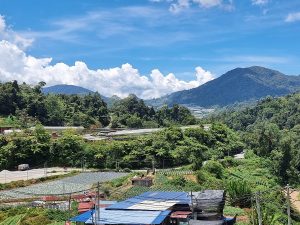
Cameron-Highlands
Since its earliest tea plantations in 1929, Cameron Highlands has grown to become a key player in the agricultural landscape of Malaysia, producing 40 per cent of all vegetables grown. Despite Malaysia shifting its economic focus away from agriculture, the industry remains imperative for food security and the livelihoods of hundreds of thousands all throughout the country.
In recent years, the area has blossomed into a lively agrotourism hub, prompting local and international tourists alike to flock to the area for strawberry-picking activities and tea plantation visits. With the rise of the highlands’ popularity, the Pahang district nestled in the mountains has also seen a rise in development. Many have attributed the recent issues Cameron Highlands has been facing, namely landslides and soil erosion, to this. The need for accommodation and infrastructure cannot be denied, however, we must consider the potential it has to cut down on arable farmland and the risk this poses to food security on both national and international levels.
Nordin Abdullah, founding chairman of Malaysia Global Business Forum (MGBF) said, “While one approach is to ensure all viable land is utilised for growing, the next phase of the journey must include further application of best practices and standards. This will require increased investment and involvement of the government to empower smaller stakeholders with less resources to allocate for processes like documentation and training.”
“With efforts underway to increase sustainability and incorporate elements of ESG (Environmental, Social, and Governance) the Cameron Highlands should be the focal point for taking the agricultural industry higher,” Nordin continues.
Of course, while not all available land should be used for farming crops, the question is if the space being allocated for it now is being utilised to its full potential and if it is sustainable for Malaysia in the long run. This, along with ensuring systematic governance and worker welfare must be prioritised moving forward to maintain Cameron Highlands’ status as both an agricultural stronghold and an agritourism hub.
The Ministry of Agriculture and Food Industries (MAFI) and the Malaysian Agricultural Research and Development Institute (MARDI) have been steadfast in their efforts to increase research and development on food security and push for Malaysia Good Agricultural Practice (myGAP) to be adopted on a wider scale nationwide. Cameron Highlands currently stands well above the Malaysian average for myGAP certification, with just under 25 per cent of its agricultural area being certified compared to the six per cent in all of Malaysia.

